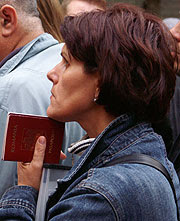George W. Bush's disastrous war in Iraq has put Europe in a bind. The United States long has been Europe's protector. Now, because of a war it wanted no part of, Europe finds its security undermined.
Chaos in Iraq has empowered Iran - a much more dangerous country for Europe than Iraq ever was. And, with America bogged down in Iraq, Russian President Vladimir Putin has resurrected Soviet-style bullying tactics. Would Russia otherwise have dared to threaten to re-direct its nuclear missiles at European cities ?
Not only has Bush destroyed Iran's most formidable enemy and bogged down US troops in a hopeless cause; he also has enriched energy-abundant Iran and Russia by pursuing a war that has dramatically raised energy prices. High crude oil prices make it easier for Iran to build nuclear weapons and for Russia to use energy blackmail to threaten Europe.
But Europe can fight back. By imposing a stiff tax on energy consumption, Europeans would reduce both consumption of energy and its price in world markets, in turn cutting the flow of funds to Russia and Iran.
Because crude oil is priced in US dollars, and the dollar has depreciated against the euro, European consumers have gotten off relatively easy from rising energy prices. So an energy tax roughly equal to the euro's 33% appreciation in recent years would be about right.
Europeans might be forgiven for thinking that the Americans, who pumped up oil prices in the first place with their military misadventure in Iraq, should be the ones who "pump it down" with an energy tax. But, with a "Texas oil man" in the White House, it won't happen. Perhaps after 2008, the politics in America will change in favor of an energy tax, but such a tax is needed now.
Besides, given the strength of environmentalism in Europe, the issue is tailor-made for Europeans to take the lead. Moreover, Europeans do not narrowly equate national security with military spending. They know that confiscating the checkbooks of Russia and Iran would probably make the world a lot safer than building another submarine or aircraft carrier. Indeed, an energy tax would not only effectively counter the argument that Europeans are "free riders" when it comes to defense; it would be tantamount to defense leadership.
Still, with the amount of real resources transferred to their governments already high, Europeans might balk at a further increase. That is why the energy tax must be imposed as a tax substitution, with income or payroll taxes simultaneously reduced to keep real resource transfers to government at a constant level. This would increase economic growth as well as strengthen national security.
Critics who worry about the cost of the energy tax have not thought about tax substitutions. They also do not seem to realize that an energy tax is a much cheaper way for Europe to protect itself from Iran and Russia than alternative means, such as a defense buildup.
Europe currently lacks military muscle because it made a decision a half-century ago to be protected by the US and devote the saved resources to building up its welfare state. This strategy - which worked well for decades - always carried the risk that at some point America's resources might be tied up elsewhere, leaving Europe under-protected. That risk materialized with the Iraq war.
But Europeans are showing little taste for increased defense spending, Iraq or no Iraq. Even France's new president, Nicolas Sarkozy - thought by many to be a pro-American foreign policy hawk - is backing away from his campaign promise to maintain defense spending at 2% of GDP.
In a recent speech to the French defense industry, Sarkozy conspicuously failed to repeat the pledge, instead warning that he soon might cut France's defense budget. According to a respected defense industry publication, Sarkozy changed his mind after his party's smaller-than-anticipated victory in June's parliamentary election.
The reason Europeans are reluctant to increase defense spending is expense. Cutting welfare spending - where the big money is - would be painful. Solemn promises made over the years would have to be broken (people would not get the social services that they paid for with a lifetime of high taxes), lives would be shortened (less money for hospitals and nursing homes), and overall hardship increased.
Even economic growth will not prevent a tradeoff between defense and welfare spending for Europeans. Fifty years of defense dependence on the US has created a powerful "peace industry" in Europe whose primary business is to fight defense spending tooth and nail. They will want to protect all social spending, regardless of the consequences for foreign policy.
A counterweight to the "peace crowd" may be new migrants from Eastern Europe, for whom cuts in social services would break no promises, and for whom job availability and wage levels are more important. But it will take some time before the new migrants gain decisive political influence, and the problems of Iran and Russia for Europe require immediate attention.
In short, Europeans will not allow Bush's Iraq war to become a war on their welfare state. What makes the energy imposed as a tax substitution tax particularly attractive as a defense measure is that it leaves the welfare state intact while making Europe safer, greener, and richer. Why wait ?
Melvyn Krauss is a senior fellow at the Hoover Institution, Stanford University.
www.project-syndicate.org
Melwyn KraussZiua Vineri 03 Iulie 2007 http://www.ziua.net/english
.jpg)































.jpg)

















